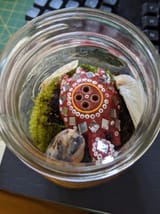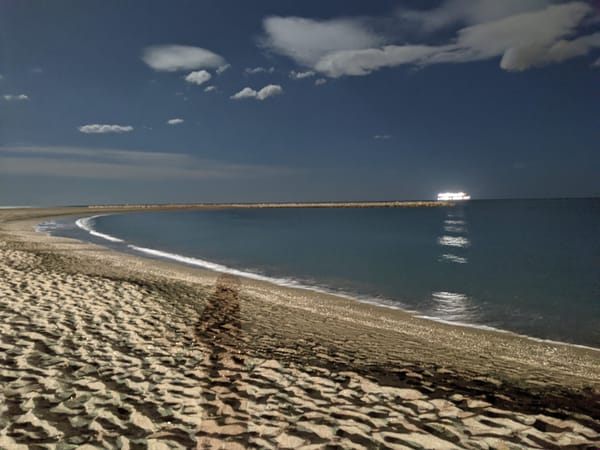naming my caste privilege

Hello friends,
Happy Dalit History Month, and advanced Bhim Jayanti! (Babasaheb Ambedkar's birthday is on April 13)
I'm caste-privileged, and I wanted to write to you this week some snippets from my own story of actively interrogating my own and my ancestors' role in the violence of caste oppression.

I grew up in a Tamil brahmin/dominant-caste family. Growing up, I was handed down the lie of "caste has been abolished, we don't see caste." In the same breath, there was also the "don't fall in love with anyone, especially someone outside our caste", and the "reservations in academia and employment has made it so difficult for 'us' to get opportunities". Caste as a factor of structural oppression towards the majority of the country was not a topic of discussion, but belonging to and embodying my own caste's prescriptive notions of culture and tradition was unquestionable.
In adolescence, I dated and fell in love with several boys. Not all of them were from my caste, my religion, or 'fair-skinned'. After my first time being caught and the heart-break and consequences that ensued for both me and the boy, I started to question every time I was getting close to a person—"is this somebody my parents will ever say yes to? what will happen when they find out?" I told a friend who was from a different caste that we couldn't even try to date because my parents would never agree. In retrospect, I am appalled and ashamed at myself — how I didn't allow the possibility of our romance or love to even come into being. I assumed the future, and rejected him using that same casteist (il)logic/bigotry.
Over time I figured out that it was not only caste, but markers like profession or skin colour that might endanger our status in society, could also scandalize love interests. I ended up marrying someone who I loved, of the same caste. He had a 'respectable' job and family history according to these violent norms. (We got divorced within 2 years.) I thought, at least I got to 'pick' who I marry.
Fusion of blood can alone create the feeling of being kith and kin, and unless this feeling of kinship, of being kindred, becomes paramount, the separatist feeling—the feeling of being aliens—created by Caste will not vanish. Among the Hindus, inter-marriage must necessarily be a factor of greater force in social life than it need be in the life of the non-Hindus. Where society is already well-knit by other ties, marriage is an ordinary incident of life. But where society is cut asunder, marriage as a binding force becomes a matter of urgent necessity. The real remedy for breaking Caste is inter-marriage. Nothing else will serve as the solvent of Caste.
-- Dr. B.R. (Babasaheb) Ambedkar, The Annihilation of Caste, 1936. For full text see: https://abolitionnotes.org/br-ambedkar/annihilation#annihilation-21
By 2017, I had moved to the U.S. I had started reading Black feminist works by bell hooks and Audre Lorde, and was beginning to see myself as fiercely intersectional feminist. I marched in the San Francisco Pride parade. I was participating in DEI efforts in my organizations. I was angry at "the system", and at then first-time president who is back at it now. I saw myself as brown, a woman (at the time) of color, and marginalized. I knew I had education and caste privilege, but I still didn't hold myself accountable.
In 2017, I had the honour of listening to Dalit American artist, activist and founder of Equality Labs, Thenmozhi Soundararajan, at a panel called "Centering Knowledge From The Margins:A Whose Knowledge? discussion," at Wikimania 2017 in Montréal. She talked about how hindu brahmin outrage/violence showed up during Jack Dorsey's visit to India when he was twitter's ceo. He met with Thenmozhi's colleague and other women journalists to talk about topics including caste hate on social media platforms, and took a picture holding up a poster created by Equality Labs that stated "Smash Brahminical Patriarchy". This picture blew up, and twitter was accused of being 'anti-hindu'.

In her talk, Thenmozhi explored caste oppression as it pervades South Asia and the diaspora, and the systematic erasure of Dalit histories and literature. It was likely my first time fully seeing myself in the oppressor role in a system that was well and alive, more widespread than I had known, and not a remnant of the past. I thought, "I have been so ignorant, pointing my fingers at others when I needed to look into my own actions." (Edit: I found that there is an audio snippet and photo of this panel and talk on metawiki)
I still got married to the aforementioned man according to those customs. Once I was married and returned to the U.S., I rejected hinduism, brahminism and all the practices that went with it, at least in theory. I was feeling pretty nihilistic and hopeless in general, and was merely sidestepping parts of my story I didn't like.
I started to pay attention to caste dynamics in my friendships and to talk about it more openly. One friend told me about how high and mighty I had acted in college without understanding how my lifelong educational and caste privilege had contributed to the 'dream job' I got. "You're right, I did do that. I am so sorry," I told her.
In the last three years or so, my relationship to social justice and equity work has been challenged and humbled beyond recognition. I have gone from "everything is fucked, it's the system!" to "I have read all these books, I know what to do" to "what can I possible know in the face of the genocides unfolding in Palestine and the world over" to "I know nothing. I can only stay humble, try, fuck it up, and keep trying."

Instead of closing the book on my past, I took Thenmozhi's advice in her book The Trauma of Caste (You can purchase a copy of this book at https://dalitdiva.com/books/) to examine my history, the history of brahminism and sanskritization, and how it has shaped my ancestors and I. It has taught me to see the ways the wounds of caste lives in my body too, and that to embody caste abolition is to start by healing from within.

I name my privilege as a small part of my commitment to caste abolition and caste equity, which is deeply interconnected with gender, class, Disability, Indigenous, racial, queer and trans justice.
I leave you with this excellent "Caste Privilege 101: A primer for the privileged" resource written by "Dalit-American transmedia artist, journalist, and theorist" Thenmozhi Soundararajan and "Dalit Tamil scholar, artist, and activist", Sinthujan Varatharajah: https://theaerogram.com/caste-privilege-101-primer-privileged/ (author descriptions borrowed from their bios at the end of this linked essay).
In my next post, I'll follow up with more books, documentaries, organizations and initiatives that are led by Dalit, Adivasi and caste-oppressed artists, activists and movement leaders that I have been reading and learning from.
Thanks for being here! <3




